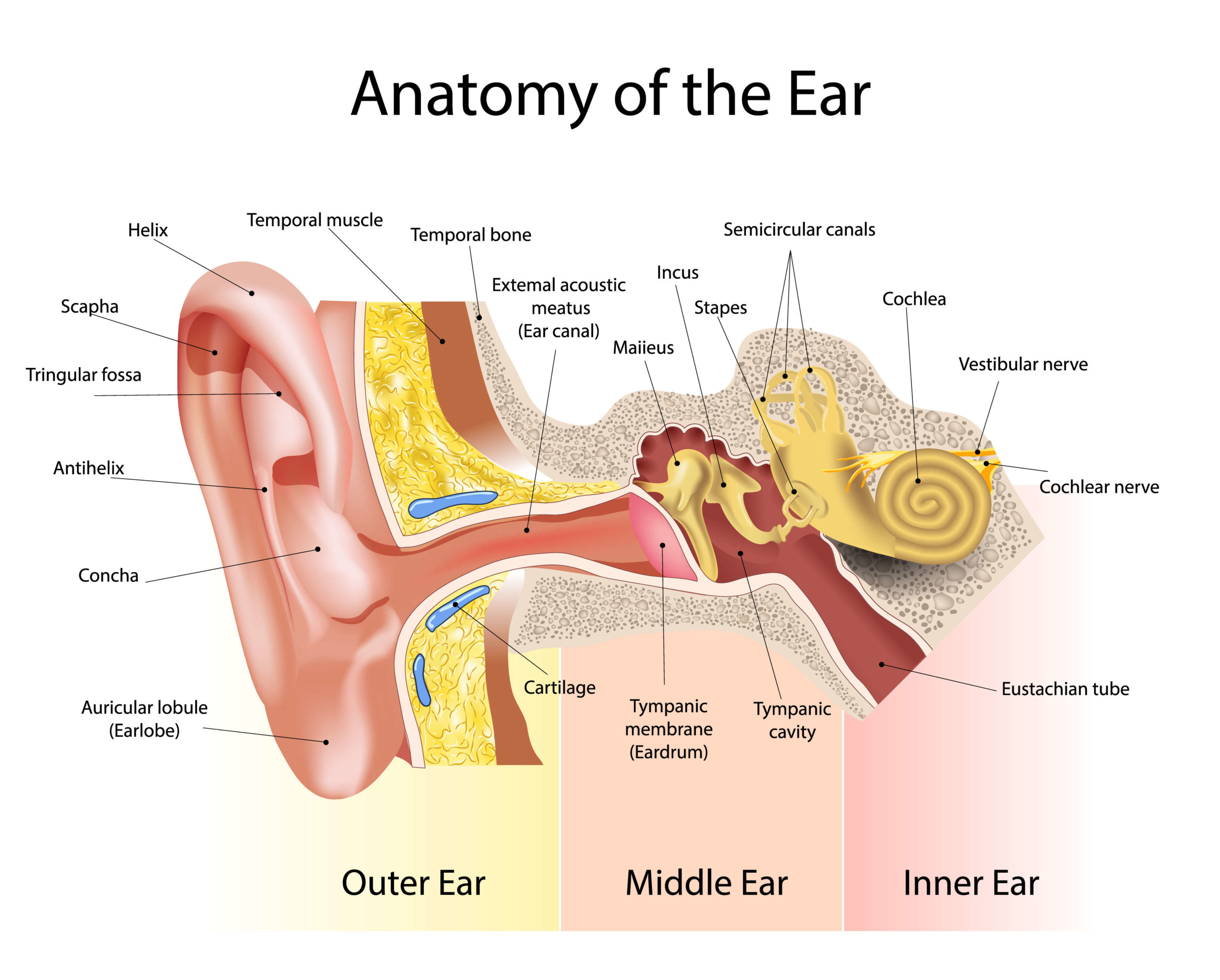Hearing loss is the third most common health problem in the United States, affecting people of all ages. If left untreated, hearing loss can affect your ability to understand speech and can negatively impact your social and emotional well-being, decreasing your overall quality of life.
Hearing loss affecting adults is typically associated with aging, but can also be due to hereditary factors, noise exposure (occupational and recreational), viral and bacterial infections, heart conditions or stroke, head injuries, tumors, and certain medications.
Hearing loss is described by varying degrees, not percentages. Hearing loss may be mild, moderate, moderately-severe, severe, or profound, and it can vary across pitches. A person’s hearing deficit is determined by a simple hearing test, where the amount of volume loss you experience is compared to an average of many other adult listeners with normal auditory ability.
The volume, or intensity, of sounds you hear, is measured in decibels (dB), with 0 dB being the softest whisper and 120 dB being a jet engine. The softest sounds a person can hear are called thresholds. Normal hearing thresholds for adults are considered 0 to 25 dB.

There are four main types of hearing loss: conductive, sensorineural, mixed, and neural.
Conductive hearing loss occurs when there is a problem with the way sound is conducted to the inner ear and a structure called the cochlea. The problem may lie in the ear canal, eardrum (tympanic membrane), or the middle ear (ossicles and Eustachian tube). The inner ear remains unaffected in this type of hearing loss.
What Are The Symptoms of A Conductive Hearing Loss?
Individuals with conductive hearing loss may report the following symptoms:
What Causes Conductive Hearing Loss?
There are several causes of conductive hearing loss including
Conductive hearing loss can be temporary or permanent, depending on the source of the problem. Medical management can correct some cases, while amplification may be a recommended treatment option in long-standing or permanent cases.
Sensorineural hearing loss occurs when there is a problem with the sensory receptors of the hearing system, specifically in the cochlea of the inner ear. The majority of cases occur as a result of an abnormality or damage to the hair cells in the cochlea. This abnormality prevents sound from being transmitted to the brain normally, which results in hearing loss.
What Are the Symptoms of Sensorineural Hearing Loss?
Individuals with sensorineural hearing loss may report the following symptoms:
What Causes Sensorineural Hearing Loss?
Congenital. These hair cells have been abnormal since birth, which is considered a congenital condition.
Damage to Hair Cells. A deficit in hearing also occurs when the cells are damaged as a result of genetics, infection, drugs, trauma, or over-exposure to noise (late-onset or acquired).
Presbycusis. Hair cells are damaged as a result of the aging process, which causes a kind of hearing loss known as presbycusis (pres-be-cue-sis).
Sensorineural hearing loss is generally permanent and may stay stable or worsen over time. Routine hearing tests are needed to monitor the hearing loss. Amplification is the most common treatment, and it includes hearing aids or cochlear implants in the most severe cases.
Mixed hearing loss occurs when a person has an existing sensorineural hearing loss in combination with conductive hearing loss. This type of hearing deficit is considered a mix of sensorineural and conductive hearing losses, which means there is a problem in the inner ear as well as in the outer and/or middle ear.
The conductive hearing loss may be temporary or permanent, depending on the source of the problem. Mixed hearing loss can sometimes be treated with medical management, and hearing aids are a common treatment recommendation.
Neural hearing loss occurs when the auditory nerve that carries impulses from the cochlea to the brain is missing or abnormal. This form of hearing deficit is difficult to diagnose, as the exact location of neural hearing loss is not always evident to hearing specialists.
To treat neural hearing loss, amplification may be recommended in some cases, depending on the severity of the damage to the hearing nerve. Individuals with neural hearing loss often have difficulty understanding speech, even when it is loud enough, especially in background noise.
What Causes Neural Hearing Loss?
Causes of neural hearing loss include the following:
According to the Better Hearing Institute, studies suggest that untreated hearing loss can lead to some or all of the following:
If you think you need a hearing test, take this NIDCD hearing test developed for adults ages 18 to 64. There are 10 quick questions to help you determine if you should have your hearing tested by a hearing healthcare professional.

A quiz for adults ages 18 to 64. The results of this quiz do not substitute for medical advice. Please see our disclaimer below.

If you suspect you have a hearing loss, you should seek professional advice as soon as possible, because some hearing problems can be quite serious as they may be due to other related illnesses or certain medications.
At Infinity Hearing, our audiologists will identify and measure the type and degree of your hearing loss and will recommend treatment options that best fit your needs and lifestyle.
Contact us today for your hearing healthcare needs. We offer on-site hearing tests, hearing aids, and hearing protection. For your convenience, you may schedule an appointment online or give us a call at (207) 451-2700.